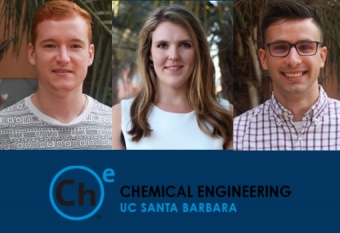
The 13th annual Amgen-Clorox Graduate Student Symposium, hosted by UC Santa Barbara’s Chemical Engineering Department on September 25 , looked different than in years past. Due to the COVID-19 pandemic, student organizers turned the typical in-person symposium into a virtual event. Their months of planning paid off as students still delivered top notch student presentations about their innovative research and gave them an opportunity to network.
“We understood that a virtual event could easily connect the department with a wider audience, and therefore we put a great deal of thought and preparation into the format and broadcasting of the event to make it approachable, accessible, and productive for all participants,” said Pavel Shapturenka, a member of Professor Michael Gordon’s research group who served as event co-chair with Shona Becwar. “We expanded the participant list this year to include faculty from other research institutions, allowing for more exposure of our fifth-year students who are also interested in pursuing academic career paths.”
The virtual format provided greater flexibility for attendees to tune into the day’s events, which featured research presentations by rising fifth-year graduate students and breakout sessions for students to have informal conversations about career development and professional opportunities with representatives from industry and academia.
“The highlight of the event was the remarkable richness and quality of content presented by our cohort, which spanned a variety of disciplines,” said Becwar, the co-chair who is co-advised by professors Bradley Chmelka and Songi Han. “We were fortunate to have hosted more than 160 total attendees, including more than 50 external industrial and academic participants, which was a greater turnout than the average in-person event.”
Based on votes cast by the guests, the organizing committee presented four awards to student presenters. The Highest-Rated Technical Quality Award went to Becwar (pictured in center), while Nicholas Sherck (pictured on right) received the Best Nominated Afternoon Talk Award. Clarke Palmer (pictured on far left) received the Best Nominated Morning Session Talk and the Highest-Rated Presentation Quality awards.
“I feel humbled to have won these awards, especially among so many high-level presentations from my colleagues. It also feels rewarding to have a general engineering audience excited about your work,” said Palmer, who is advised by Professor Eric McFarland. “I strongly feel that as engineers we have two primary jobs: do complicated things, and explain those complicated things to all types of audiences. Sometimes both of these tasks can be equally as challenging!”
Palmer’s talk, titled “Catalytic Methane Chemistry in High-Temperature Molten Environments,” discussed how his group is investigating new ways to produce CO2-free energy products, such as hydrogen, from low-cost natural gas by using molten metal and molten salt systems. They work in conjunction with the New Energies and Research Technology group at Royal Dutch Shell.
“We have done many exciting proof-of-concepts at the laboratory scale, but still have many more hurdles to tackle if we want to see this technology become industrialized,” explained Palmer. “Working so closely with a large energy company like Shell makes the possibility of a more rapid and large-scale deployment that much more possible if we are successful.”
Co-advised by professors M. Scott Shell and Glenn Fredrickson, Sherck’s research focuses on particle and field representations to simulate complex soft matter formulations, like lubricants, detergents, and shampoos. His talk, “Integrating Particle and Field Representations: Engineering Soft Matter Formulations in-Silico,” explained his groups’ pioneering computational tools that allow them to predict properties of complex systems without experimental input. Their research will enable scientists to engineer next-generation materials by rapidly predicting properties of a nearly unlimited chemical design space.
“It is overwhelmingly gratifying to see my hard work as a researcher and as a presenter pay off,” said Sherck, who received the Best Nominated Afternoon Talk Award. “This event is tremendously important for rising fifth-year graduate students, because it not only gives us an opportunity to present several years of hard work at UCSB, but it also provides an invaluable opportunity to showcase our work to potential employers and industry partners. I personally was able to use the event to make several connections with industry representatives.”
Becwar presented her research of conductive networks for energy applications that do not require traditional precious-metal-containing catalysts. Her presentation, titled “Understanding and Correlating Compositions, Structures and Properties of Conductive Networks for Energy Conversion and Storage Applications,” highlighted new insights provided by her thesis, which has focused on mesoporous iron, nitrogen-carbons prepared by high-temperature condensation and pyrolysis of small molecule precursors. They have exhibited high and accessible surface areas, high electrical conductivities, and high electrocatalyic activities that are comparable to more expensive fuel cells and cathodes in lithium-sulfur batteries. Becwar said she was honored to be recognized with the Highest-Rated Technical Quality Award.
“All of the presentations were very good, so winning among such a great selection feels like a real accomplishment,” said Becwar, who went on to explain the potential impact of her groups’ work. “Correlating the insights from my research with increased reduction activities provides specific goals for the design of improved electrocatalysts for applications in energy storage and conversion.”
Becwar and Shapturenka said based on the increased attendance and positive feedback they have received, they recommend that future symposiums include a virtual component.



